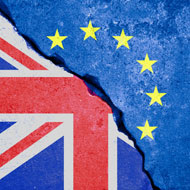Brexit report recognises vital role of vets

The report calls on the government to ensure that the industry is able to retain or recruit qualified staff to fill official veterinarian roles post-Brexit.
There is an overwhelming reliance on non-UK EU citizens to fill crucial official veterinarian positions in the UK, a parliamentary committee has concluded.
The report from the House of Lords calls on the Government to ensure that the industry is able to retain or recruit qualified staff to fill these roles post-Brexit.
It comes at a time when there are significant concerns in the industry over how Brexit, and its impact on EU migration, might affect the veterinary profession.
‘Veterinarians play a key role in ensuring and inspecting farm animal health and welfare in the UK from farm to abattoir,’ the committee concludes.
‘They also play an important role in certifying animals in the context of trade. We note the overwhelming reliance on non-UK EU citizens to fill crucial official veterinary positions in the UK, and call on the Government to ensure that the industry is able to retain or recruit qualified staff to fill these roles post-Brexit.’
Responding, Gudrun Ravetz, president of the BVA, said that the EU Committee’s recognition of the vital role vets play in animal health, welfare and public health is “extremely encouraging.”
“Official Veterinarians (OVs) working in abattoirs protect and reassure UK consumers, certifying and supervising the import and export of animals and animal products to third countries,” she said.
“As I outlined in my evidence to the Committee, some estimates suggest 95 per cent of OVs working in UK abattoirs graduated overseas, mostly in the EU. However, we are already hearing of fewer applicants for veterinary public health roles since the Referendum."
She continues: “There are significant concerns about the potential impact of a post-Brexit veterinary workforce shortage on the UK's £100 billion agri-food sector, in terms of risking business and consumer confidence as well as the UK’s future export capability. A strong, sustainable veterinary workforce is absolutely vital to safeguarding animal health, welfare and public health post Brexit.”
The report, Brexit: farm animal welfare, was published by the EU Energy and Environment Sub-Committee on Tuesday (25 July).



 The veterinary mental health charity Vetlife is inviting the veterinary community to join it for a sponsored cold-water dip.
The veterinary mental health charity Vetlife is inviting the veterinary community to join it for a sponsored cold-water dip.